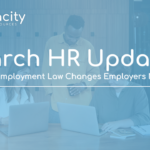December 2024 HR Updates
We wrap up 2024 with several important HR and employment law updates.
December 2024 HR Updates: DOL Salary Threshold
On November 15th, a U.S. District Court Judge for the Eastern District of Texas blocked the U.S. Department of Labor’s (DOL) planned increase to the exempt salary threshold.
Background
The DOL increased the Fair Labor Standards Act (FLSA) annual salary level threshold on 7/1/24 to $43,888 ($844 per week) for executive, administrative, and professional exemptions (typically referred to as the white collar exemptions). The next increase to $58,656 ($1,128 per week) was slated to take effect on 1/1/25.
As a reminder, to be classified under the “white collar” exemptions, an employee must generally meet three tests:
- the employee must be paid a predetermined and fixed salary;
- the salary must meet or exceed a weekly amount set by the DOL; and
- the employee’s job duties must primarily involve executive, administrative, or professional duties.
The Impact
The Court’s decision not only blocked the planned 1/1/25 increase, it rolled back the 7/1/24 increase, and invalidated the planned automatic updates. As a result, the salary threshold for white-collar exemptions effectively reverts to the previous level of $684 per week ($35,568 annually). This decision is effective on a nationwide basis for all employers.
What’s Next?
The DOL could appeal the Court’s decision, but with the upcoming change in presidential administration an appeal seems unlikely. Employers should carefully consider any next steps as a result of this change, especially if increases in salaries or changes in exempt/non-exempt status were already made to comply with the July increase and in anticipation of the January increase.
December 2024 HR Updates: “Captive Audience” Meeting Ban
On November 13th, the National Labor Relations Board (NLRB) ruled that mandatory employer meetings about the organization’s position on union and unionization violate the National Labor Relations Act (NLRA). This controversial ruling finds that such meetings – commonly referred to as “captive audience” meetings – are unlawful because they have a reasonable tendency to interfere with employee Section 7 rights.
The Board argued that such meetings in essence compel employees to participate, at least as listeners; intrude on employee privacy surrounding Section 7 rights by providing a method for employers to monitor and surveil employees; and lends a coercive aspect to the messaging and information.
The Board clarified that an employer may lawfully hold meetings with workers to express views on unionization when several factors are met:
- workers are provided with reasonable advance notice of the subject of the meeting;
- attendance is voluntary and without adverse consequences to those that do not attend; and
- attendance (or lack thereof) at the meeting is not recorded.
What’s Next?
Legal experts critical of the ruling argue the decision ignores 75 years of precedent, contradicts the language of the NLRA, and expects the ruling to be subject to appeal and reversal.
December 2024 HR Updates: FTC Noncompete Ban Update
On August 20th, the U.S. District Court for the Northern District of Texas set aside the Federal Trade Commission’s (FTC) proposed ban on noncompete agreements, ruling the FTC did not have the authority to issue such a broad action. In response the FTC made clear it’s plan to challenge noncompete agreements through case-by-case enforcement actions and in October, the FTC appealed the Court’s decision. However, many legal experts opine the appeal may lose steam after the change in presidential administration in January.
Minnesota Employers
Minnesota employers, remember that Minnesota already made changes limiting noncompete clauses in July of 2023.
December 2024 HR Updates: Pay Info for Job Posts in Minnesota
Effective January 1, 2025, any “person or entity that employs 30 or more employees” in Minnesota must disclose in job postings “the starting salary range” and a general description of the benefits and other compensation that will be offered to the applicant hired for the position. This follows a growing trend towards increased transparency in job posts. As a reminder, effective January 1, 2024, Minnesota employers are prohibited from asking job applicants about pay history.
December 2024 HR Updates: Minnesota ESST Amendment
An amendment to Minnesota ESST (Earned Sick and Safe Time) will be effective at the turn of the new year.
Under the current version of the law, if an employer provides paid time off (PTO) more generous than what is required by ESST regulations, the employer has the ability to outline how the time off is used.
Effective January 1, 2025, if an employer provides PTO that can be used for personal illness or injury, it must meet the same requirements as ESST hours. This includes notice, documentation, and anti-retaliation requirements.
This example is provided by the Minnesota Department of Labor and Industry:
For example, if an employee receives 50 hours of PTO in addition to the minimum requirement of 48 ESST hours per year, the employer must follow the ESST requirements about notice, documentation, anti-retaliation, replacement workers and more for the additional PTO hours when they are used for an ESST-qualifying purpose.
On The Horizon
Update on the Minnesota Secure Choice Retirement Program. The State provided an update to employers that it is now anticipated the Program will not open for enrollment until the first quarter of 2026. Once operational, this state-mandated retirement plan will provide a retirement option for private sector employees who don’t have an employer-sponsored retirement plan.
Stay Tuned!
Stay tuned for updates and consult with a trusted advisor to fully understand how these laws impact your organization.
Originally published in the December edition of Business North.
About the Author

Human Resources thought leader, Stacy Johnston, provides innovative solutions with a mission to support organizations in understanding and engaging their biggest competitive advantage… their employees. Johnston is a licensed attorney and holds the SHRM-CP credentials.
Interested in HR support? Need to update your Handbook? Check out the online resources at www.audacityhr.com or reach out and connect with us!!






